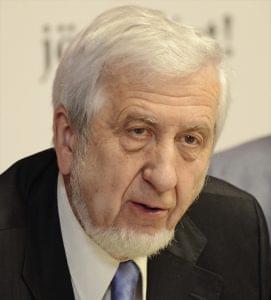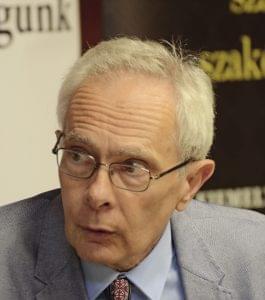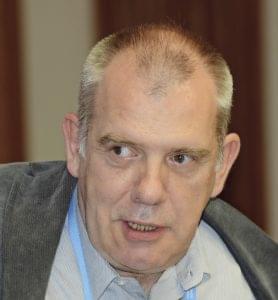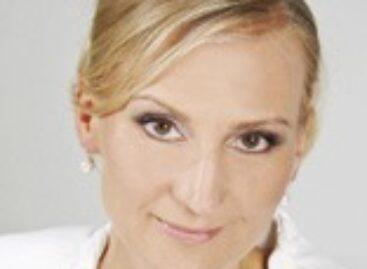Geopolitical and economic visions for the period after 2020
One again Trade magazin and Chain Bridge Club have organised their popular Business Dinner event. This year the topic was Hungary’s future in the EU, mass migration’s influence on the Hungarian and the European economy and the strength of the V4 countries. Szilvia Krizsó was the moderator of the roundtable discussion and she first gave the floor to Dr Géza Jeszenszky, historian and former Minister of Foreign Affairs, who talked about the government’s ‘double talk’: in his view they say that the European Union and NATO are important and good, but at the same time they also want ‘to stop Brussels’.

Dr Géza Jezsenszky
historian and former Minister of Foreign Affairs

Dr Péter Ákos Bod
economist and former Minister of Industry and Trade
Dr Péter Ákos Bod, economist and former Minister of Industry and Trade was of the opinion that today’s politicians look at the West differently than their predecessors, with less dedication and higher expectations. Around 2008 and 2009 it seemed that the BRICS countries (Brazil, Russia, India, China and South Africa) would overtake western democracies, but in the last decade the West adapted to the new situation. For instance the German economy, which is of utmost importance for Hungary, is on a steady growth path.

Dr Péter Tálas
security policy expert and director of the National University of Public Service’s Centre for Strategic and Defence Studies
Dr Péter Tálas, security policy expert and director of the National University of Public Service’s Centre for Strategic and Defence Studies, talked about three important periods: the so-called Europeanisation process, which lasted until 2004 and was very powerful in Hungary. This was followed by a kind of renationalisation, when nation states developed around the EU countries. The third trend was globalisation, in which it causes a problem that the EU, in order to make us stronger, takes away some of our sovereignty – while at the same time renationalisation’s goal is to strengthen this sovereignty.
Discussing the role the countries of the Visegrád Four play in the EU, Dr Bod told that with the UK leaving the EU and the acceleration of a restructuring process in the European Union, in the new situation the V4 might break into two. Mr Tálas added that after the elections in Germany Europe is likely to start going in a new direction: another integration that won’t be fast. A two-speed Europe will develop.
Europe’s population is decreasing by 5-7 percent and the migrants keep coming – these two factors constitute the biggest challenge ahead of Europe at the moment. Dr Jeszenszky shares the view that this can be Europe’s biggest problem in the near future, even more so because he thinks that migrants don’t want to integrate. In connection with Hungary’s policy of opening to the East, Dr Bod analysed the interesting situation Russia is in at the moment.
Despite Trump’s surprising win at the elections, Dr Jeszenszky hopes that the USA will remain strong and the country’s foreign policy will stay decisive on the world stage. Dr Bod underlined that the USA is a dynamic country that leaves crises behind quickly, and one of the reasons they are capable of this is the country’s demographic situation that is different from Europe’s. Dr Tálas’ view is that Trump will concentrate on three things: economic nationalisation, the Pentagon’s influence in foreign policy and fast and tangible victories. //
Related news
The future of the Hungarian food industry: sustainable innovation
Both as owner of Real Nature Kft. and as chairperson…
Read more >Chain Bridge Club October exclusive: Even with high purchasing power, there are challenges: an up-close view of the Belgian market
Péter Szautner, managing director of FrieslandCampina gave an insight into…
Read more >On the threshold of a paradigm shift in food supply – Food policy analyst Réka Szöllősi was the guest at the September meeting of Chain Bridge Club
First Réka Szöllősi told in her retrospective that consumer protection…
Read more >Related news
Fruit and vegetables in the spotlight
Spring 2025 isn’t only important for the fruit and vegetable…
Read more >The future of the Hungarian food industry: sustainable innovation
Both as owner of Real Nature Kft. and as chairperson…
Read more >







